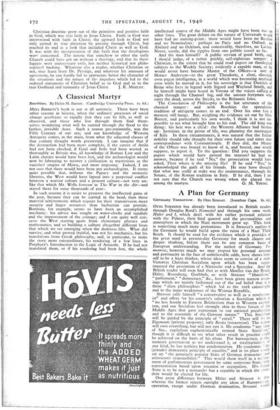A Classical Martyr
Boethius. By Helen M. Barrett. (Cambridge University Press. 7s. 6d.)
Miss Baaitarr's book is not at all untimely. There have been other seasons in history, when the ordinary processes of social change accelerate so rapidly that they can be felt, as well as observed, and those who live through them find them- selves wondering what will be carried through the flood to the farther, invisible :Imre. Such a season pre-eminently, was the Fifth Century of our era; and our knowledge of Western Antiquity comes, in the main, from what the educated classes of that century thought worth preserving. I can imagine that if the destruction had been more complete, if the career of Attila had not been checked, if Gaul and Italy had been wasted as thoroughly as Britain was, all knowledge of Roman Law and the Latin classics would have been lost, and the archaeologist would now be labouring to recover a civilisation as mysterious as the vanished empire of Minos, and more imposing. Indeed, I am not sure that there would have been any archaeologists. It seems quite possible that, without the Papacy and the monastic libraries, the West would have lapsed into a perpetual conflict between a warrior culture and a peasant culture—not very un- like that which Mr. Wells foresaw in The War in the Air—and stayed there for some thousands of years.
In such seasons it is easier to preserve the intellectual gains of the past, because they can be carried in the head, than those material achievements which require for their transmission more security and larger resources than barbarism can provide. Boethius, for example, seems to have been an accomplished mechanic: his advice was sought on water-clocks and sundials and the improvement of the coinage; and I can quite well con- ceive the West starting again from elementary physics and mathematics, and so building a culture altogether different from that which we see emerging when the darkness lifts. What did survive, and what proved fruitful, was not his mechanics, but his translations from Greek philosophy, and, in particular, to make the story more extraordinary, his rendering of a few lines in Porphyry's Introduction to the Logic of Aristotle. If he had not translated them, or if his rendering had been lost, the whole
intellectual course of the Middle Ages might have been run on other lines. The great debate on the nature of Universals would have had no starting-point : there would have been no Realists and no Nominalists: perhaps no Paris and no Oxford; no Abelard and no Ockham, and conceivably, therefore, no Luther. Never, surely, did the ripples from one pebble travel so far.
And the man himself? A public servant of good birth, and, I should judge, of a rather prickly, self-righteous temper: a Christian, tc the extent that he could read papers on theological subjects to the Weekly Society; evidently a capable man, or he would never have become Master of the Offices—a sort of Horace Anderson—to the great Theodoric, a clear, classical, even pagan intelligence, in a world which was becomifig mythical even while he moved in it, for his sovereign is that Dietrich of Berne who lives in legend with Sigurd and Wayland Smith, and he himself might have heard in Verona of the voices calling at night through the Channel fog, and the unseen ferrymen who carry the dead, across the Straits, to the Britannic Isles.
The Consolation of Philosophy is the last utterance of the classical temper : and with Boethius the speculative tradition of antiquity comes to an end. Over his own fate a mystery still hangs. But, weighing the evidence set out by Miss Barrett, and particularly his own words, I think it is not im. possible to see what brought him to his end. The old king was dying: his heir was a child: the Western Alliance had broken up: Justinian, in the prime of life, was planning the reconquest of Italy In these circumstances, it was natural that the Italian nobility should take thought for their own future and enter into correspondence with Constantinople. If they did, the Master of the Offices was bound to know of it, and bound, one would suppose, to report it. To the question: Did you suppress the papers which would have proved the treason? he had no answer, because if he said " No," the prosecution would have asked, Then where is the missing file? If he said "Yes," he acknowledged the guilt of his friends. He may have thought that what was really at stake was the maintenance, through the Senate, of the Roman tradition in Italy. If he did, then I am not sure that the Church was wrong when she placed him


























 Previous page
Previous page